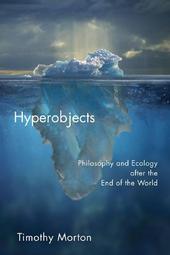
|
Hyperobjects: Philosophy and Ecology after the End of the World
Paperback / softback
Main Details
| Title |
Hyperobjects: Philosophy and Ecology after the End of the World
|
| Authors and Contributors |
By (author) Timothy Morton
|
| Series | Posthumanities |
|---|
| Physical Properties |
| Format:Paperback / softback | | Pages:240 | | Dimensions(mm): Height 216,Width 140 |
|
| Category/Genre | Non-western philosophy
Conservation of the environment |
|---|
| ISBN/Barcode |
9780816689231
|
| Classifications | Dewey:110 110 |
|---|
| Audience | | General | | Professional & Vocational | |
|---|
| Illustrations |
23
|
|
Publishing Details |
| Publisher |
University of Minnesota Press
|
| Imprint |
University of Minnesota Press
|
| Publication Date |
23 September 2013 |
| Publication Country |
United States
|
Description
Having set global warming in irreversible motion, we are facing the possibility of ecological catastrophe. But the environmental emergency is also a crisis for our philosophical habits of thought, confronting us with a problem that seems to defy not only our control but also our understanding. Global warming is perhaps the most dramatic example of what Timothy Morton calls "hyperobjects"--entities of such vast temporal and spatial dimensions that they defeat traditional ideas about what a thing is in the first place. In this book, Morton explains what hyperobjects are and their impact on how we think, how we coexist with one another and with nonhumans, and how we experience our politics, ethics, and art.
Author Biography
Timothy Morton is Rita Shea Guffey Chair in English at Rice University. He is the author of many books, including The Ecological Thought and Ecology without Nature. He blogs frequently at Ecology without Nature.
Reviews"In Hyperobjects, Timothy Morton brings to bear his deep knowledge of a wide array of subjects to propose a new way of looking at our situation, which might allow us to take action toward the future health of the biosphere. Crucially, the relations between Buddhism and science, nature and culture, are examined in the fusion of a single vision. The result is a great work of cognitive mapping, both exciting and useful."-Kim Stanley Robinson, author of Shaman, 2312, and the Mars trilogy "Not only does Morton range from William Wordsworth to the Velvet Underground to Nagasaki to Republican denialism, he does it in a way that marshals these disparate allusions in the service of a cogent idea, one that manages to come off as both intuitive and radical."-Newsweek "[This book] is bold, stimulating, and provocative. With extraordinary verve and audacity, Morton makes his hyperobjects into harbingers for a new epoch, on a planetary scale, a task in which he is assisted by the general consensus about the Anthropocene, the current era of human-induced planetary change."-Los Angeles Review of Books "Whatever your hopes or fears for the next major era in human history, Morton is telling us that it has already happened and it is us."-3 Quarks Daily "A relentless torrent of commentary that presents challenges to most contemporary scholarship on both sides of the still upheld nature/culture divide."-Qui Parle "Morton's work bridges a gap between academia and the global warming movement with a postmodern angle."-Vogue "Morton is unafraid to mix theory with personal and often confessional material, anchoring his arguments to his own experience of the world."-A Year's Work in Critical Culture and Theory
|